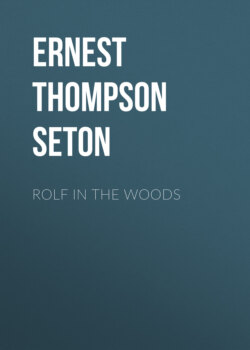Читать книгу Rolf in the Woods - Ernest Thompson Seton - Страница 7
На сайте Литреса книга снята с продажи.
Chapter 3. Rolf Catches a Coon and Finds a Friend
ОглавлениеTable of Contents
Aunt Prue, sharp-eyed and red-nosed, was actually shy at first, but all formality vanished as Rolf was taught the mysteries of pig-feeding, hen-feeding, calf-feeding, cow-milking, and launched by list only in a vast number of duties familiar to him from his babyhood. What a list there was. An outsider might have wondered if Aunt Prue was saving anything for herself, but Rolf was used to toil. He worked without ceasing and did his best, only to learn in time that the best could win no praise, only avert punishment. The spells of good nature arrived more seldom in his uncle's heart. His aunt was a drunken shrew and soon Rolf looked on the days of starving and physical misery with his mother as the days of his happy youth gone by.
He was usually too tired at night and too sleepy in the morning to say his prayers, and gradually he gave it up as a daily habit. The more he saw of his kinsfolk, the more wickedness came to view; and yet it was with a shock that he one day realized that some fowls his uncle brought home by night were there without the owner's knowledge or consent. Micky made a jest of it, and intimated that Rolf would have to “learn to do night work very soon.” This was only one of the many things that showed how evil a place was now the orphan's home.
At first it was not clear to the valiant uncle whether the silent boy was a superior to be feared, or an inferior to be held in fear, but Mick's courage grew with non-resistance, and blows became frequent; although not harder to bear than the perpetual fault-finding and scolding of his aunt, and all the good his mother had implanted was being shrivelled by the fires of his daily life.
Rolf had no chance to seek for companions at the village store, but an accident brought one to him. Before sunrise one spring morning he went, as usual, to the wood lot pasture for the cow, and was surprised to find a stranger, who beckoned him to come. On going near he saw a tall man with dark skin and straight black hair that was streaked with gray—undoubtedly an Indian. He held up a bag and said, “I got coon in that hole. You hold bag there, I poke him in.” Rolf took the sack readily and held it over the hole, while the Indian climbed the tree to a higher opening, then poked in this with a long pole, till all at once there was a scrambling noise and the bag bulged full and heavy. Rolf closed its mouth triumphantly. The Indian laughed lightly, then swung to the ground.
“Now, what will you do with him?” asked Rolf.
“Train coon dog,” was the answer.
“Where?”
The Indian pointed toward the Asamuk Pond.
“Are you the singing Indian that lives under Ab's Rock?
“Ugh! [*] Some call me that. My name is Quonab.”
“Wait for an hour and then I will come and help,” volunteered Rolf impulsively, for the hunting instinct was strong in him.
The Indian nodded. “Give three yelps if you no find me;” then he shouldered a short stick, from one end of which, at a safe distance from his back, hung the bag with the coon. And Rolf went home with the cow.
He had acted on hasty impulse in offering to come, but now, in the normal storm state of the household, the difficulties of the course appeared. He cudgelled his brain for some plan to account for his absence, and finally took refuge unwittingly in ancient wisdom: “When you don't know a thing to do, don't do a thing.” Also, “If you can't find the delicate way, go the blunt way.”
So having fed the horses, cleaned the stable, and milked the cow, fed the pigs, the hens, the calf, harnessed the horses, cut and brought in wood for the woodshed, turned out the sheep, hitched the horses to the wagon, set the milk out in the creaming pans, put more corn to soak for the swill barrel, ground the house knife, helped to clear the breakfast things, replaced the fallen rails of a fence, brought up potatoes from the root cellar, all to the maddening music of a scolding tongue, he set out to take the cow back to the wood lot, sullenly resolved to return when ready.
* Ugh (yes) and wah (no) are Indianisms that continue no
matter how well the English has been acquired.
